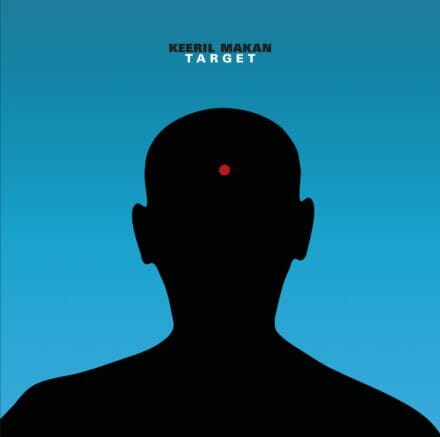This CD presents the premiere recordings of four works by the rising-star composer Keeril Makan, described as “an arrestingly gifted young American composer” by The New Yorker.
David Lang, co-founder of the Bang on a Can festival and a Pulitzer-winning composer, wrote the CD’s Introduction. He remarks that when he first heard Makan’s music he was “blown away” by works that were “so strong and so smart.”
The title piece emerged from Makan’s participation in the John Harbison/Dawn Upshaw Workshop for Composers and Singers. Commissioned by Carnegie Hall, Makan collaborated with poet Jena Osman to create Target (2004) for soprano and chamber ensemble. Regarding Target’s premiere at Carnegie Hall, The New York Times observed:
“‘Target,’ is a moody, ruminative and volatile setting of a text assembled from poems by Jena Osman and phrases taken from leaflets dropped over Afghanistan in the wake of Sept. 11, scored for mezzo-soprano and four instrumentalists, including a percussionist. It is meant as a stinging political commentary on American military intervention abroad. Mr. Makan responded to the earthy, rich and poignant qualities of Ms. Rubin’s voice by writing music thick with sliding, moaning figurations for the voice and all the instruments… she gave a courageous performance of difficult music that clearly speaks to her.”
Makan comments, “When I composed Target in 2003-4, I thought the subject matter, the wars in Iraq and Afghanistan, would quickly become dated. Unfortunately, Target remains stubbornly relevant, not only because of the West’s continuing presence in those countries, but because PsyOps remains a key technique of U.S. military operations.”
Listen to NPR’s Weekend Edition interview with Keeril about Target.
Lang attended the premiere of the “muscular and terrifying” Target, “a scary, aggressive juggernaut of invention.” He remarks that the disturbing text captures “a kind of violent, psychological damage that takes place deep beneath the surface layer of ordinary words.” The CD’s performance features Rubin and the California E.A.R. Unit.
The CD opens with 2 (1998), performed by the Either/Or duo of Jennifer Choi (violin) and David Shively (percussion). 20th Century Music writes, “This was a masterful piece, one of the best heard this year. Far from music in the abstract, 2 is a work-it-out-in-the-raw-sounds kind of piece that revels in its sonic splendors.”
Zones d’accord (2002) was commissioned by the Fondation Royaumont for a new piece for dance with French choreographer Françoise Murcia. Performed on the CD by Alex Waterman from Either/Or, the work won First Prizes at the Atlanta and Tuscaloosa concerts of the Hultgren Solo Cello Works Biennial. Sequenza21 comments, “The virtuosity of Waterman’s right hand is truly stunning… [and he] draws out Makan’s ecstatic emotional arc throughout the performance.”
The CD ends with Resonance Alloy (2007, commissioned by Other Minds), recorded by percussionist David Shively in an astonishing, single, unedited performance of the 29 minute work. This piece intensely explores continuously shifting timbres produced by vibrating metals. Makan writes:
“Resonance Alloy is directly inspired by James Tenney’s Having Never Written a Note for Percussion (1971) generally performed on a tam-tam and Alvin Lucier’s Silver Streetcar for the Orchestra (1988) for amplified triangle. These two pieces awaken the listener to the timbral possibilities that exist in a single percussion instrument. Like these seminal works, Resonance Alloy seeks to create immensely complex and beautiful masses of sound through simple actions.”
Lang concludes that “the emotionality of it all, the drama, the depth of feeling, percolating way down deep, never boiling over and yet never going away” is “strangely powerful, and all his own.”
The exceptionally high-quality sound results from all the original recordings being made at high-resolution (24-bit, 48k/88.2k sampling) audiophile standards. The three non-vocal works were recorded by the Grammy-winning Silas Brown, who used DPA microphones, Millennia preamps, Prism converters, and Merging Pyramix DAWs.
Makan’s music has been described as “memorably explosive” (International Herald Tribune), “a fascinating wedding of intellect and expressivity” (Newsday), and “hard-driving and visceral, but not without moments of quiet, beautiful repose” (Andante.com).
Trained as a violinist, Makan received degrees in composition and religion from Oberlin and his PhD in composition at the University of California, Berkeley. Recipient of the 2008 Rome Prize from the American Academy in Rome, Makan has also received awards from the American Academy of Arts and Letters, the Fromm Foundation, the Gerbode Foundation, the Hewlett Foundation, Meet the Composer, and ASCAP. He is Associate Professor of Music at MIT.
Numerous ensembles have championed Makan’s music, including the Chamber Music Society of Lincoln Center, the International Contemporary Ensemble, Kronos Quartet, Paul Dresher Ensemble, Del Sol String Quartet, New York New Music Ensemble, Newspeak, Continuum, Le Nouvel Ensemble Moderne, Scharoun Ensemble Berlin, Argento Chamber Ensemble, and the New Juilliard Ensemble.
Makan’s only other CD, In Sound (Tzadik), received impressive reviews: “Top 10 CDs for 2008” (New Music Box); “An amazing disc”(Sequenza21); “frontiers are crossed in this music” (American Record Guide).







